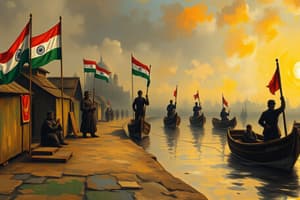Podcast
Questions and Answers
Who led most of the political associations formed after 1850?
Who led most of the political associations formed after 1850?
- British officials and administrators.
- English-educated professionals such as lawyers. (correct)
- Military generals and commanders.
- Religious leaders and spiritual gurus.
What crucial question did the people ask in response to the mentioned developments?
What crucial question did the people ask in response to the mentioned developments?
- How can India be for Indians despite the British control?
- Why were the political associations formed after 1850?
- What is the country of India meant for? (correct)
- Who was exercising control over the resources of India?
What is the literal meaning of 'sarvajanik' in 'Poona Sarvajanik Sabha'?
What is the literal meaning of 'sarvajanik' in 'Poona Sarvajanik Sabha'?
- Of or for all the people (correct)
- Of or for a single region
- For a specific group of people
- Only for English-educated professionals
What was the emerging answer regarding India and its people?
What was the emerging answer regarding India and its people?
When did the awareness of British control over India's resources begin to be clearly stated?
When did the awareness of British control over India's resources begin to be clearly stated?
What were the goals of the political associations formed after 1850?
What were the goals of the political associations formed after 1850?
What intensified the dissatisfaction with British rule in the 1870s and 1880s?
What intensified the dissatisfaction with British rule in the 1870s and 1880s?
What was the key feature of nationalism believed by the early Indian nationalists?
What was the key feature of nationalism believed by the early Indian nationalists?
What was the purpose of the Vernacular Press Act enacted in 1878?
What was the purpose of the Vernacular Press Act enacted in 1878?
Why were Indians enraged by the attempt to introduce the Ilbert Bill in 1883?
Why were Indians enraged by the attempt to introduce the Ilbert Bill in 1883?
What need was established when 72 delegates from all over the country met at Bombay in December 1885?
What need was established when 72 delegates from all over the country met at Bombay in December 1885?
Who largely comprised the early leadership of the Indian National Congress?
Who largely comprised the early leadership of the Indian National Congress?
What role did Dadabhai Naoroji play in the early leadership of the Indian National Congress?
What role did Dadabhai Naoroji play in the early leadership of the Indian National Congress?
Which act disallowed Indians from possessing arms in 1878?
Which act disallowed Indians from possessing arms in 1878?
What did the Vernacular Press Act allow the government to do if newspapers published objectionable content?
What did the Vernacular Press Act allow the government to do if newspapers published objectionable content?
'Who initiated the establishment of an all-India organisation of educated Congress?'
'Who initiated the establishment of an all-India organisation of educated Congress?'
Study Notes
Early Nationalism in India
- After 1850, most political associations were led by English-educated Indians.
- In response to the developments, people asked: "What have we gained from British rule?"
- 'Sarvajanik' in 'Poona Sarvajanik Sabha' literally means "of or for all the people".
- The emerging answer regarding India and its people was that they were a nation, not just a collection of people.
Rise of Nationalism
- The awareness of British control over India's resources began to be clearly stated in the 1860s and 1870s.
- The goals of the political associations formed after 1850 were to promote discussions on social and political issues, and to submit petitions to the government.
- Economic hardships, such as the famine of 1876-1878, intensified dissatisfaction with British rule in the 1870s and 1880s.
Characteristics of Early Nationalism
- The key feature of nationalism believed by the early Indian nationalists was that India was a nation, and it was an expression of the desire for independence from British rule.
- The Vernacular Press Act of 1878 allowed the government to confiscate the assets of any newspaper that published "seditious" material.
Key Events and Legislation
- Indians were enraged by the attempt to introduce the Ilbert Bill in 1883, which would have allowed Indian judges to try European settlers.
- The Arms Act of 1878 disallowed Indians from possessing arms.
- The meeting of 72 delegates from all over the country at Bombay in December 1885 established the need for an all-India organisation of educated Indians.
- The early leadership of the Indian National Congress was largely comprised of English-educated Indians, and Dadabhai Naoroji played a key role in its early leadership.
- A. O. Hume initiated the establishment of an all-India organisation of educated Indians, which led to the formation of the Indian National Congress.
Studying That Suits You
Use AI to generate personalized quizzes and flashcards to suit your learning preferences.
Description
Test your knowledge about the emergence of nationalism in India, including the factors that led people to question the concept of India and their realizations about their rights and resources. Explore the impact of British control and the development of a sense of national identity.




